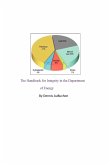The Department of Defense (DOD) is at the center of the nation's discussion about national energy security. DOD, the largest single consumer of fuel in the United States, recognizes that it plays a central role in national efforts to reduce the use of and reliance on fossil fuel. Aviation fuel makes up the largest portion of fossil fuel consumed by DOD and therefore represents the area of greatest potential savings. This report examines DOD's use of aviation fuel, presents options available to reduce that use, discusses relevant issues, and concludes with an analysis of the challenges DOD and the Air Force faces in becoming less reliant on fossil fuel. Reducing DOD's consumption of aviation fuel could by itself significantly reduce the department's overall reliance on fossil fuel. In Fiscal Year 2005, DOD consumed roughly 125 million barrels of oil approximately 1.2% of the nation's total. About 74% of that was used to power mobility vehicles Air Force aircraft, Navy ships, and Army ground vehicles. Over half roughly 52% was aviation fuel. There are several ways in which DOD can reduce its use of fossil-based aviation fuel. Each has advantages and disadvantages and no single option provides the perfect solution. Advanced technologies, such as synthetic fuels, offer potential alternatives but further development and study are required before DOD can employ them on a large scale. DOD can also take measures to decrease its use of fuel.
Hinweis: Dieser Artikel kann nur an eine deutsche Lieferadresse ausgeliefert werden.
Hinweis: Dieser Artikel kann nur an eine deutsche Lieferadresse ausgeliefert werden.








